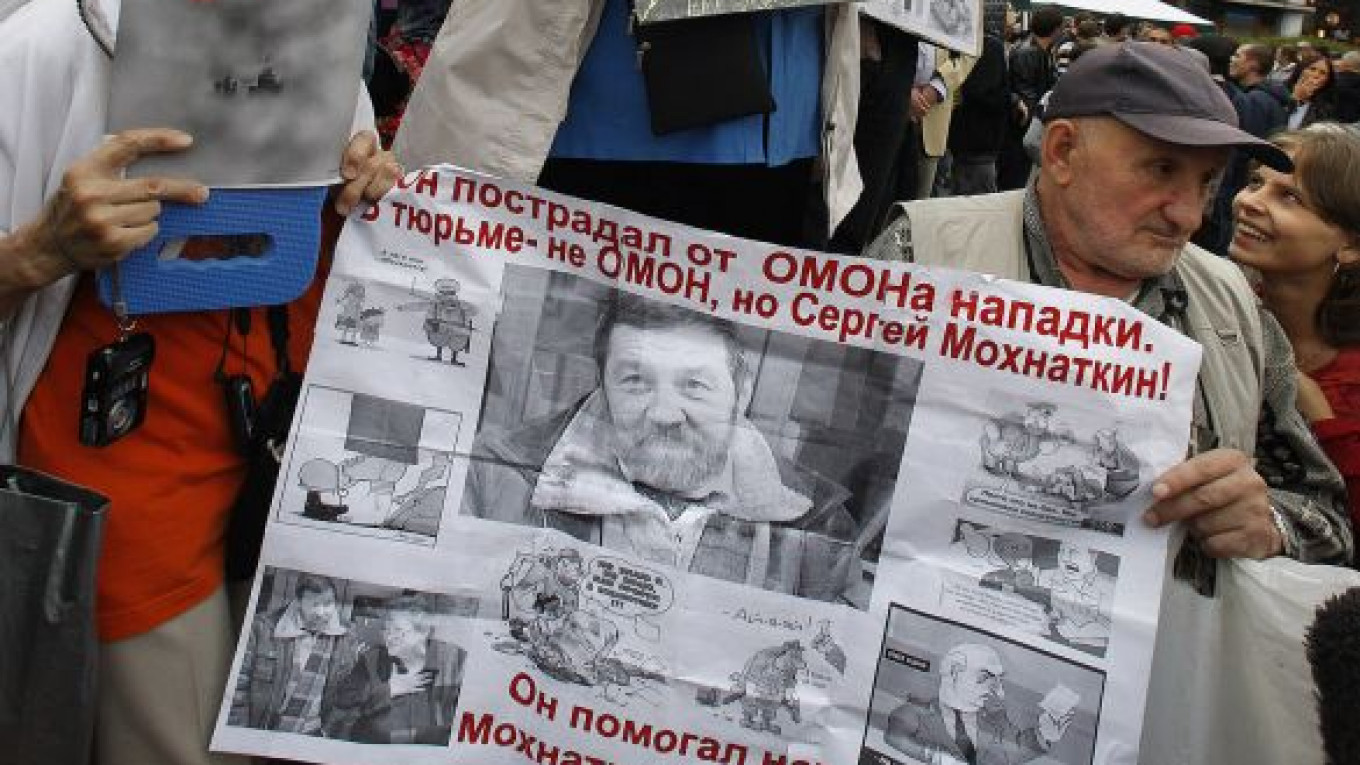President Dmitry Medvedev on Monday pardoned a man who had become a lightening rod for the opposition movement after an accident of history led to his imprisonment following a 2009 protest rally.
Sergei Mokhnatkin, 58, has served two years of a 2 1/2-year sentence stemming from a New Year's Eve rally in Moscow at which he stepped in when he said a cop was shoving an elderly female protester.
Medvedev pardoned Mokhnatkin alongside 13 others, saying he was following “principles of humanity,” but some analysts saw it as a public relations move by an outgoing leader.
Mokhnatkin's lawyer Valery Shukhardin said Monday that despite the president's order, the head of the Tver region prison colony where Mokhnatkin is held has refused to let him go, saying the original pardon decree is required and not just a faxed copy of it.
Shukhardin said he believed that Mokhnatkin would be freed in two days, Russian News Service radio reported.
Mokhnatkin's name was included on a list of prisoners submitted to Medvedev by human rights activists who suggested that their detentions were improper.
The list contained 40 names, including those of former Yukos founder Mikhail Khodorkovsky and his business partner Platon Lebedev. Neither were among the group pardoned.
Medvedev had earlier declined to pardon Khodorkovsky, saying he had never requested one. Under Russian law, a prisoner appealing for a pardon must ask the president directly.
Aside from Mokhnatkin, none of the other prisoners from the list presented by opposition leaders was freed. The prisoners pardoned were largely jailed for ordinary, nonpolitical crimes.
One of them, Sergei Dikaryov from the Belgorod region, was sentenced in December 2010 to two years and 10 months for selling 70 grams of marijuana.
Mokhnatkin, a native of Izhevsk in the republic of Udmurtia with no political affiliation, claimed that he had not been a participant in the Strategy 31 demonstration on Dec. 31, 2009, on Triumfalnaya Ploshchad and was just passing by when he saw an officer roughing up an older woman and decided to intervene.
Police say the cop ended up with a broken nose. Mokhnatkin ended up in jail and his case became a rallying cry for the opposition who dubbed him a political prisoner and a human rights icon.
An amateur musician and an engineer by training, Mokhnatkin told The Moscow Times during a prison visit earlier this year that he had been victimized by the colony's administration. He wrote several complaints and demanded his basic rights be met.
“They bully me when they can,” he said in February.
The news of Mokhnatkin's pardon was met with a cheerful reaction from the opposition blogging community who praised his fight against the system.
But the news received a mixed reaction from human rights activists and political experts who accused the outgoing president of using the case as a publicity stunt to paper over other human rights abuses.
“It was a clear public relations stunt. Medvedev took a path of least resistance,” said Pavel Salin, an analyst with the Center for Current Politics.
He pointed out that Mokhnatkin was also eligible for parole as he had already served most of his prison sentence.
“Today we have a person who lost two years of his life, and his case won't be reconsidered,” Salin said.
He noted that Medvedev didn't pardon Taisia Osipova, the wife of a radical activist who was jailed over drug charges some say were fabricated. In February, Osipova's sentence was overturned and the case sent back for retrial soon after Medvedev asked prosecutors to look into it.
Human rights activist Lev Ponomaryov noted that Mokhnatkin was not a “prisoner of conscience.”
“He was not critical of the authorities, but just got punished — he became collateral damage,” Ponomaryov told Russian News Service radio on Monday.
Mokhnatkin was not a political activist before he was jailed, although those who have visited him in prison said he might now become one because of his character and hunger for justice.
A Message from The Moscow Times:
Dear readers,
We are facing unprecedented challenges. Russia's Prosecutor General's Office has designated The Moscow Times as an "undesirable" organization, criminalizing our work and putting our staff at risk of prosecution. This follows our earlier unjust labeling as a "foreign agent."
These actions are direct attempts to silence independent journalism in Russia. The authorities claim our work "discredits the decisions of the Russian leadership." We see things differently: we strive to provide accurate, unbiased reporting on Russia.
We, the journalists of The Moscow Times, refuse to be silenced. But to continue our work, we need your help.
Your support, no matter how small, makes a world of difference. If you can, please support us monthly starting from just $2. It's quick to set up, and every contribution makes a significant impact.
By supporting The Moscow Times, you're defending open, independent journalism in the face of repression. Thank you for standing with us.
Remind me later.






